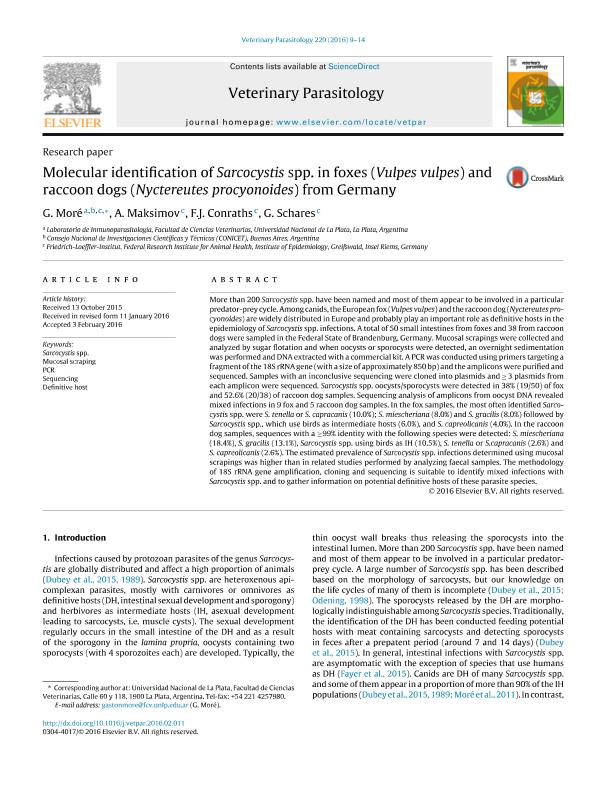Artículo
Molecular identification of Sarcocystis spp. in foxes (Vulpes vulpes) and raccoon dogs (Nyctereutes procyonoides) from Germany
Fecha de publicación:
04/2016
Editorial:
Elsevier Science
Revista:
Veterinary Parasitology
ISSN:
0304-4017
Idioma:
Inglés
Tipo de recurso:
Artículo publicado
Clasificación temática:
Resumen
More than 200 Sarcocystis spp. have been named and most of them appear to be involved in a particular predator-prey cycle. Among canids, the European fox (Vulpes vulpes) and the raccoon dog (Nyctereutes procyonoides) are widely distributed in Europe and probably play an important role as definitive hosts in the epidemiology of Sarcocystis spp. infections. A total of 50 small intestines from foxes and 38 from raccoon dogs were sampled in the Federal State of Brandenburg, Germany. Mucosal scrapings were collected and analyzed by sugar flotation and when oocysts or sporocysts were detected, an overnight sedimentation was performed and DNA extracted with a commercial kit. A PCR was conducted using primers targeting a fragment of the 18S rRNA gene (with a size of approximately 850 bp) and the amplicons were purified and sequenced. Samples with an inconclusive sequencing were cloned into plasmids and ≥ 3 plasmids from each amplicon were sequenced. Sarcocystis spp. oocysts/sporocysts were detected in 38% (19/50) of fox and 52.6% (20/38) of raccoon dog samples. Sequencing analysis of amplicons from oocyst DNA revealed mixed infections in 9 fox and 5 raccoon dog samples. In the fox samples, the most often identified Sarcocystis spp. were S. tenella or S. capracanis (10.0%); S. miescheriana (8.0%) and S. gracilis (8.0%) followed by Sarcocystis spp., which use birds as intermediate hosts (6.0%), and S. capreolicanis (4.0%). In the raccoon dog samples, sequences with a ≥99% identity with the following species were detected: S. miescheriana (18.4%), S. gracilis (13.1%), Sarcocystis spp. using birds as IH (10.5%), S. tenella or S.capracanis (2.6%) and S. capreolicanis (2.6%). The estimated prevalence of Sarcocystis spp. infections determined using mucosal scrapings was higher than in related studies performed by analyzing faecal samples. The methodology of 18S rRNA gene amplification, cloning and sequencing is suitable to identify mixed infections with Sarcocystis spp. and to gather information on potential definitive hosts of these parasite species.
Palabras clave:
Definitive Host
,
Mucosal Scraping
,
Pcr
,
Sarcocystis Spp.
,
Sequencing
Archivos asociados
Licencia
Identificadores
Colecciones
Articulos(CCT - LA PLATA)
Articulos de CTRO.CIENTIFICO TECNOL.CONICET - LA PLATA
Articulos de CTRO.CIENTIFICO TECNOL.CONICET - LA PLATA
Citación
Moré, Gastón Andrés; Maksimov, A.; Conraths, F. J.; Schares, G.; Molecular identification of Sarcocystis spp. in foxes (Vulpes vulpes) and raccoon dogs (Nyctereutes procyonoides) from Germany; Elsevier Science; Veterinary Parasitology; 220; 4-2016; 9-14
Compartir
Altmétricas




